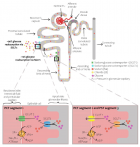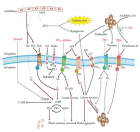Abstract
Research Article
Assessment of indigenous methods of shea butter processing among rural women in Borgu Local Government Area of Niger State, Nigeria
Ibrahim Sani* and Musa Masud
Published: 04 November, 2022 | Volume 6 - Issue 3 | Pages: 146-150
Indigenous food processing and preservation methods are on the verge of collapse, yet they proved promising and sustainable. The study assessed the indigenous methods of shea butter processing among rural women in the Borgu Local Government Area of Niger State, Nigeria. Specifically, it described the socioeconomic characteristics of respondents, examined the shea butter processing techniques used and identified the information sources of shea butter processors in the study area. A multistage sampling technique was used to select 100 respondents. Descriptive (such as frequency count, percentage, charts and tables) and inferential statistics (such as Pearson correlation and chi-square) were used to analyze the data. Findings showed the mean age of respondents was 45.61 ± 11.82, with mean years of experience of 20.39 ± 12.96, the majority (85%) were married and the major sources of information on indigenous shea butter processing came from family members and friends. At p ≤ 0.01 there was a significant association between respondents’ usage of indigenous methods and their marital status
(ᵡ2 = 84.24; p ≤ 0.01), membership in cooperative society (ᵡ2 = 40.43; p ≤ 0.01), and community membership (ᵡ2 = 53.21; p ≤ 0.01). However, there was a significant relationship between respondents’ usage of indigenous methods and household size (b = 0.290; p ≤ 0.05), quantity produced (b = 0.616; p ≤ 0.10) and annual income (b = -0.765; p ≤ 0.05). It was concluded that indigenous methods of processing shea butter are widespread among respondents; knowledge is acquired through family and friends. Among others, the study recommends that extension agents be posted to rural areas to educate rural women and build on their indigenous knowledge of processing shea butter to introduce high-quality butter.
Read Full Article HTML DOI: 10.29328/journal.jpsp.1001088 Cite this Article Read Full Article PDF
Keywords:
Indigenous methods; Shea butter; Processing; Rural women
References
- Adesiji GB, Olarewaju KD, Olaleye RS, Komolafe SE. Assessment of indigenous methods of processing shea butter among women in Ilorin East local government area of Kwara State, Nigeria. Journal of Agricultural Sciences (Belgrade). 2015; 60(2): 199-210.
- Issahaku H, Al-Hassan R, Sarpong DB. An analysis of allocative efficiency of shea butter processing methods in the northern region of Ghana. Journal of Development and Agricultural Economics. 2011; 3(4):165-173. http://www.academicjournals.org/JDAE
- Okullo JBL, Omujal F, Agea JG, Vuzi PC, Namutebi A, Okello JBA, Nyanzi SA. Physico-chemical characteristics of Shea butter (Vitellaria paradoxa CF Garten.) oil from the Shea district of Uganda. African Journal of Food Agriculture Nutrition and Development. 2010; 10(1).
- Grenier L. Working with indigenous knowledge: A guide for researchers. idrc. 1998.
- Issahaku H, Sarpong DB, Al-hassan R. Evaluating the viability of shea butter production: A comparative analysis. Research Journal of Finance and Accounting. 2012; 3.
Figures:

Figure 1

Figure 2
Similar Articles
-
Avermectins: The promising solution to control plant parasitic nematodesMohamed S Khalil*,Dalia M Darwesh. Avermectins: The promising solution to control plant parasitic nematodes. . 2019 doi: 10.29328/journal.jpsp.1001036; 3: 081-085
-
The Importance of Potato virus Y PotyvirusMahmoud Hamdy Abd El-Aziz*. The Importance of Potato virus Y Potyvirus. . 2020 doi: 10.29328/journal.jpsp.1001044; 4: 009-015
-
Assessment of indigenous methods of shea butter processing among rural women in Borgu Local Government Area of Niger State, NigeriaIbrahim Sani*,Musa Masud. Assessment of indigenous methods of shea butter processing among rural women in Borgu Local Government Area of Niger State, Nigeria. . 2022 doi: 10.29328/journal.jpsp.1001088; 6: 146-150
Recently Viewed
-
Pneumothorax as Complication of CT Guided Lung Biopsy: Frequency, Severity and Assessment of Risk FactorsGaurav Raj*,Neha Kumari,Neha Singh,Kaustubh Gupta,Anurag Gupta,Pradyuman Singh,Hemant Gupta. Pneumothorax as Complication of CT Guided Lung Biopsy: Frequency, Severity and Assessment of Risk Factors. J Radiol Oncol. 2025: doi: 10.29328/journal.jro.1001075; 9: 012-016
-
The Police Power of the National Health Surveillance Agency – ANVISADimas Augusto da Silva*,Rafaela Marinho da Silva. The Police Power of the National Health Surveillance Agency – ANVISA. Arch Cancer Sci Ther. 2024: doi: 10.29328/journal.acst.1001046; 8: 063-076
-
A Comparative Study of Serum Sodium and Potassium Levels across the Three Trimesters of PregnancyOtoikhila OC and Seriki SA*. A Comparative Study of Serum Sodium and Potassium Levels across the Three Trimesters of Pregnancy. Clin J Obstet Gynecol. 2023: doi: 10.29328/journal.cjog.1001137; 6: 108-116
-
Chaos to Cosmos: Quantum Whispers and the Cosmic GenesisOwais Farooq*,Romana Zahoor*. Chaos to Cosmos: Quantum Whispers and the Cosmic Genesis. Int J Phys Res Appl. 2025: doi: 10.29328/journal.ijpra.1001107; 8: 017-023
-
Phytochemical Compounds and the Antifungal Activity of Centaurium pulchellum Ethanol Extracts in IraqNoor Jawad Khadhum, Neepal Imtair Al-Garaawi*, Antethar Jabbar Al-Edani. Phytochemical Compounds and the Antifungal Activity of Centaurium pulchellum Ethanol Extracts in Iraq. J Plant Sci Phytopathol. 2024: doi: 10.29328/journal.jpsp.1001137; 8: 079-083
Most Viewed
-
Evaluation of Biostimulants Based on Recovered Protein Hydrolysates from Animal By-products as Plant Growth EnhancersH Pérez-Aguilar*, M Lacruz-Asaro, F Arán-Ais. Evaluation of Biostimulants Based on Recovered Protein Hydrolysates from Animal By-products as Plant Growth Enhancers. J Plant Sci Phytopathol. 2023 doi: 10.29328/journal.jpsp.1001104; 7: 042-047
-
Sinonasal Myxoma Extending into the Orbit in a 4-Year Old: A Case PresentationJulian A Purrinos*, Ramzi Younis. Sinonasal Myxoma Extending into the Orbit in a 4-Year Old: A Case Presentation. Arch Case Rep. 2024 doi: 10.29328/journal.acr.1001099; 8: 075-077
-
Feasibility study of magnetic sensing for detecting single-neuron action potentialsDenis Tonini,Kai Wu,Renata Saha,Jian-Ping Wang*. Feasibility study of magnetic sensing for detecting single-neuron action potentials. Ann Biomed Sci Eng. 2022 doi: 10.29328/journal.abse.1001018; 6: 019-029
-
Pediatric Dysgerminoma: Unveiling a Rare Ovarian TumorFaten Limaiem*, Khalil Saffar, Ahmed Halouani. Pediatric Dysgerminoma: Unveiling a Rare Ovarian Tumor. Arch Case Rep. 2024 doi: 10.29328/journal.acr.1001087; 8: 010-013
-
Physical activity can change the physiological and psychological circumstances during COVID-19 pandemic: A narrative reviewKhashayar Maroufi*. Physical activity can change the physiological and psychological circumstances during COVID-19 pandemic: A narrative review. J Sports Med Ther. 2021 doi: 10.29328/journal.jsmt.1001051; 6: 001-007

HSPI: We're glad you're here. Please click "create a new Query" if you are a new visitor to our website and need further information from us.
If you are already a member of our network and need to keep track of any developments regarding a question you have already submitted, click "take me to my Query."

























































































































































